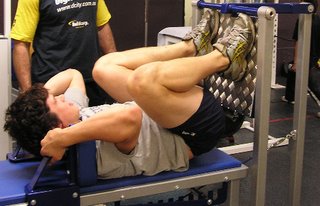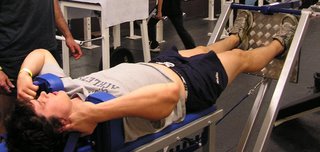
Unique features and performance characteristics:
High functionality for developing and strengthening leg extensors
The leg extensors - primarily the gluteus maximus and quadriceps - constitute the body's largest and most powerful muscle group. They are also vitally important for a wide range of athletic and sporting activities.
Traditional methods of developing and strengthening leg extensors include the barbell squat and the leg press and leg extension machines. However each of these has significant limitations. They do not adequately exercise the muscles from full flexion to full extension, and there are also issues associated with adverse loading and excessive shear forces on the lumbar region and knee joints.
The HipneeThrust has been designed to overcome these problems. As can be seen in the figure above the athlete operates from a supine position so that the action of the extensors can be effectively isolated. The recumbent position also means that the spine can comfortably cope with the compressive forces generated.
The arc through which the foot plate of the machine moves is designed to closely parallel the path that the feet would normally traverse if moved from flexion to extension without resistance. It also creates a natural tendency for the two joint angles to vary synchronously so that they are effectively sharing the load throughout the exercise movement.
Exercises the total range of limb movement

It can be seen that at the start position both hip and knee joints can be tightly flexed. As the feet move forward the trunk and shanks remain virtually parallel until the legs are fully extended. Thus the potential range of movement is from included angles of around 30° to 180°. (In fact, by starting with the feet placed low on the footplate it is possible to hyper-extend the hips beyond 180°.) Throughout this extreme range of movement high range muscle fibre recruitment is achieved by means of our QuadTorq technology.

With an exercise like the squat or a machine such as the conventional leg press, exercisers attempting heavy loads tend to restrict themselves to modest degrees of hip and knee flexion. This is because as joint flexion increases, the exerciser's capacity to cope with resistance decreases. By contrast, with the HipneeThrust the effective load is automatically reduced when the joints are flexed and increased as they extend.
Multi-functionality
The rate at which the effective resistance changes is varied by selecting different notch positions on the machine's quadrant.
With mid-range notch settings the effective load from the start of the movement to full lockout is intended to match the body's capacity to handle resistance, so that the exerciser has to expend basically the same degree of effort throughout the movement.
With low-range notch settings the increase in effective load from start to finish of the exercise movement is greatly increased. These notch settings are ideal for practising explosive or ballistic movements. When utilising heavy loads there is a "ballistic braking" effect toward the end of the movement, eliminating the need to decelerate.
High-range notch settings are ideal when the focus is on overcoming inertia, i.e., moving a heavy load from a position of rest. An example would be improving performance in the barbell squat because the additional initial loading conditions the leg extensors to operate more effectively in the deep squat position.

Laying a foundation of basic strength
Until now there has been no means of developing optimal muscle strength through the full range of a complex bi-articular movement. With the introduction of the HipneeThrust and its complement the HipneeFlex, athletes now have the means to adequately strengthen all of the major muscles of the lower limbs before focussing on sport- and activity-specific tasks. It can be confidently anticipated that this will yield significant performance and injury-reducing benefits.
squat
leg extensor
leg strength
HipneeThrust
QuadTorq










No comments:
Post a Comment